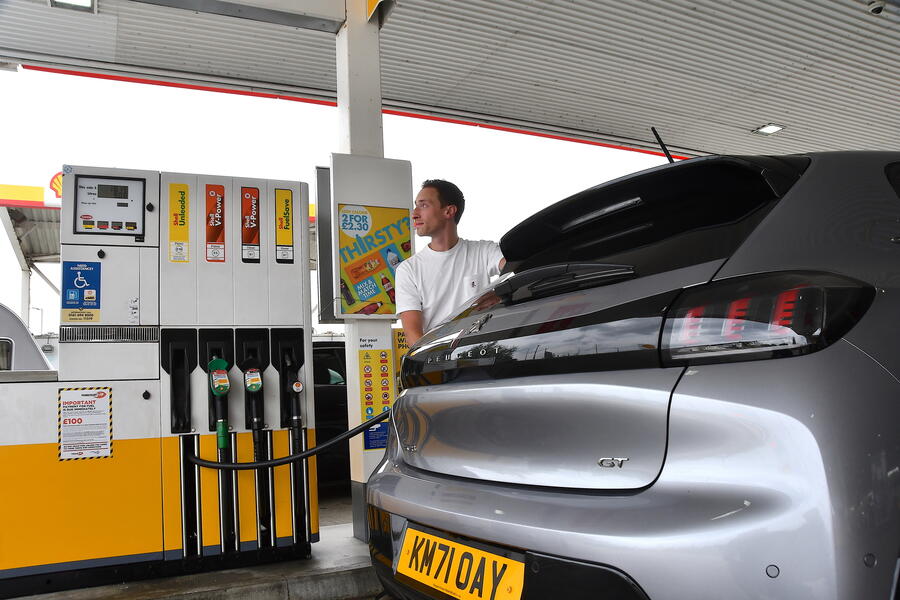This post was originally published on Autocar
Petrol dropped by an average of 6.47p per litre during September, according to the RAC
Fuel prices fell by 6.5p last month and are set to continue on a downward trajectory, according to the RAC.
Petrol cost 134.79p per litre on average at the end of September, down from 141.26ppl at the start of the month. This means that filling up a car with a 55-litre fuel tank is now £3.56 less expensive than it was at the start of September.
Diesel, meanwhile, fell from 146.00ppl to 139.5ppl over the same period, meaning a 55-litre fill-up is now £3.58 cheaper.
The RAC attributed the reduction to the drop in the price of a barrel of crude oil, from $78 (£59) at the start of September to $72 (£54) by the end.
It added that wholesale prices for petrol and diesel currently stand at 99ppl and 103ppl respectively, indicating that retail prices may fall even further.
“With analysts predicting oil may continue to fall on the back of a weakened global economy and Saudi Arabia upping its output to regain lost market share, the immediate future on the UK’s forecourts looks considerably brighter for drivers,” said Simon Williams, the RAC’s head of policy.
What determines the price of fuel?
The price of petrol and diesel you buy at the pump is largely determined by the wholesale price of Brent crude oil.
However, fluctuations in the price of this can take weeks to filter through to the forecourts.
The price of crude oil has gone up nearly $12 per barrel since the start of July 2023 to around $96 in October and now fallen to around $78.
The long-term cost of petrol
In July 2023, a major report from the Competition and Markets Authority (CMA) found that drivers paid on average 6p per litre (ppl) more for fuel in 2022 as supermarkets took advantage of weakened competition and inflated pump prices.
CMA chief Sarah Cardell, who said supermarkets were usually the cheapest place to buy fuel and market anchors, said the rising of prices would have had “a greater impact on vulnerable people, particularly those in areas with less choice of fuel stations.”
The report found the rise was instigated by Asda – which was also fined £60,000 for not co-operating fully with the CMA investigation – and Morrisons, the two cheapest fuel sellers, which last year each made the decision to target higher margins.
Asda’s fuel margin target in 2023 was more than three times what it had been for 2019, while Morrisons doubled its margin target in the same period.
Other retailers, including Sainsbury’s and Tesco, didn’t respond “in the way you would expect in a competitive market” and “instead raised their prices in line with these changes”, the CMA found.
“Taken together, this indicates that competition has weakened and reinforces the need for action,” the report added.
Diesel prices were also slow to drop in 2023, partially down to Asda ‘feathering’ its prices (reducing them more slowly as wholesale prices fell) and other firms not responding competitively to that.

The CMA estimated that drivers have paid 13ppl more for diesel from January 2023 to the end of May 2023 than if margins had been at their historic average.
“Competition at the pump is not working as well as it should be, and something needs to change swiftly to address this,” said Cardell.
As such, the CMA recommended a “fuel finder scheme” to give drivers access to live, station-by-station fuel prices on their phones or sat-navs. This would “help revitalise competition in the retail road fuel market.”
Cardell added: “We need to reignite competition among fuel retailers. This [scheme] would end the need to drive round and look at the prices displayed on the forecourt and would ideally enable live price data on sat-navs and map apps.”
The CMA also recommended bringing in a new monitoring body to “hold [the] industry to account.”
On this, the RAC’s Williams said: “The fact that drivers appear to have lost out to the tune of nearly £1 billion as a result of increased retailer margins on fuel is nothing short of astounding in a cost of living crisis and confirms what we’ve been saying for many years: that supermarkets haven’t been treating drivers fairly at the pumps.
“It’s all about action now, and we very much hope the government follows through with both of the CMA’s recommendations.
“While forcing retailers to publish pump prices is a positive step for drivers, what’s of far more significance is the creation of a fuel-monitor function within government which, we very much hope, actively monitors wholesale prices to ensure forecourts don’t overcharge when the cost they pay to buy fuel drops.
“Without this, we fear drivers will continue to get a raw deal.”

